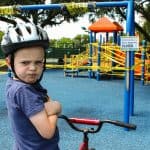Toxic Parenting is a style of parenting you do not want to expose to your children and we will look at ways you can break the toxic parenting cycle.

The way we parent is largely influenced by the way we were parented. It either makes us want to emulate their parenting styles, or steer clear from them. Indeed, a lot of parents talk about ‘breaking the cycle’, but that is easier said than done.
Psychology says that the way we were parented, particularly in early childhood, shapes the attachment styles we utilise in adulthood. These attachment styles are important because they play a big role in how we relate to other people, from our colleagues, friends, family, partners, and children.
What happens, then, if we are products of toxic parenting? Of narcissistic mothers? Given that there is a high chance we will develop insecure attachment styles from these, does it mean we are doomed to repeat the cycle?
Not necessarily.
There is a popular pro-tip going in the rounds of the pop psychology side of Twitter. It says we must learn how to heal ourselves, so that we do not pass on the generational wounds to our children. It is unrealistic, at best, because most of us do not know how to begin healing in the first place.
The good news is, it is possible to heal while raising our children. It all boils down to re-parenting our inner child while simultaneously being that parent to our children.
Re-parenting the inner child
The inner child determines our attachment styles. If we were products of toxic parenting, chances are, it is wounded. In order to develop secure attachment styles, we need to assume the role of the parents we NEEDED when we were children.
Breaking free from the cycle of toxic parenting
Toxic parents are the byproducts of toxic parents, which is why we cannot always blame them for their behaviour. It is the only way they knew how to be raised. In addition, culture and society also play a huge part in determining what makes parenting “toxic”. However, the general consensus in most cultures is that, in order to thrive, the child needs to get sufficient love, care, and attention from their parents.
It is extremely challenging to break from the behavioural patterns we have been used to, but with a little help, and a lot of discipline and determination, we can break the cycle. We can raise our children to become secure adults.
Be more aware of behaviour patterns
In order to unlearn toxic behaviour patterns, it is important that we take note and acknowledge them. For example, if we already find ourselves getting irrationally angry at our children, we can stop, take a few deep breaths, and ground ourselves to the reality of the situation.
See your children as individuals
One trait that narcissistic people have is that they tend to see others as extensions of themselves. If these people do not act according to their expectations, they see it as an affront to their egos. This toxic trait can be observed among parents too. After all, how many times have we been guilty of projecting the hopes and dreams we were unable to achieve to our children?
Children are individuals too and as they grow up, they start to make their own choices. As parents, it is our job to guide them to make the best choice for them.
Practice forgiveness
Practice forgiveness for yourself. You need not forgive and/or absolve your narcissistic mother for potentially passing on traits you might also exhibit towards your children. Some profound wounds can be difficult to heal, but practicing forgiveness can free up a lot of negative clutter in our minds. It leaves us room to take notice of our children’s achievements, rather than their failings.
Do not be afraid to seek help
“Parents that can do it all” is an impossible ideal propagated by social media. There will always be days when we just want to pull our hairs in frustration over our children’s most recent picky eating phase. When it gets too overwhelming, and we find ourselves going back on our toxic behaviour patterns, seek help.
Help comes in the form of friends and family you can vent to, and a mental health professional that can formulate a treatment plan to help you deal with your emotional wounds. Continuous education (for example, by way of parenting classes) may also ease our anxieties. Some parents feel they are terrible parents because they do not know how to deal with certain phases. By continuing to read up parenting advice, as well as listening and observing others, we are able to make more informed choices for our children, leaving less room for negativity and frustration.
Parenting is hard. Parenting ourselves along with our children is harder. In order to heal from emotional wounds, we need to cut ourselves some slack, and be more realistic about our expectations towards ourselves and the way we raise our children. Struggling for perfection in order to be validated by a toxic parent may be a familiar remnant we cannot seem to get out from, but once we challenge the cycle, it is then that we are able to successfully break it.
If you have liked this article on Breaking The cycle of Toxic Parenting then please visit us on facebook to keep you updated with more great parenting and childcare help, advice and tips.




